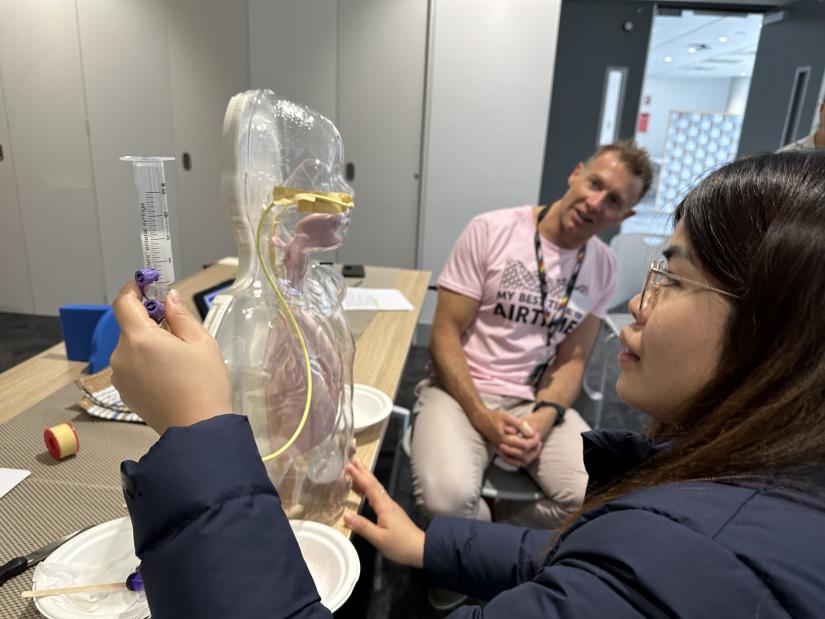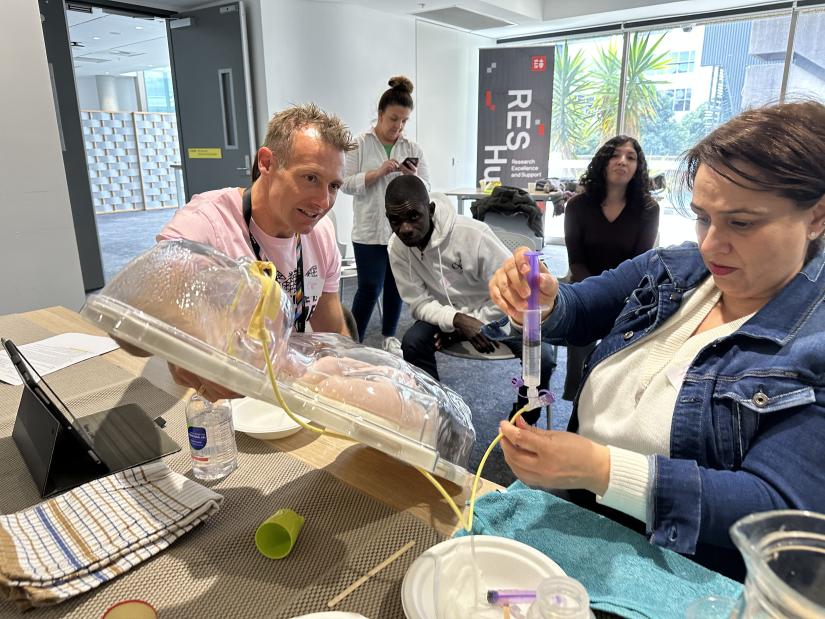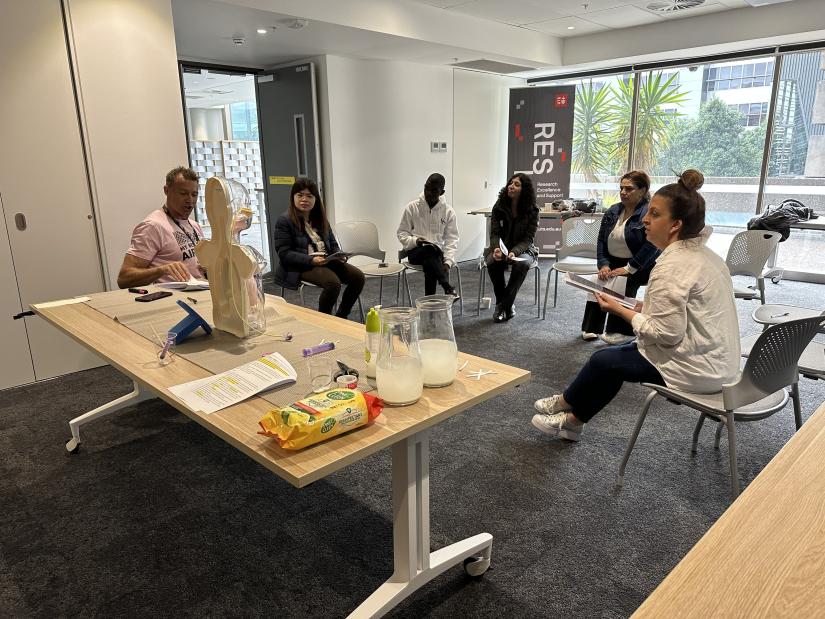Nick Hopwood’s research is turning insights of parents whose children tube feed into a brighter future for families.

If you’ve ever breast or bottle fed a baby, you’ll probably understand how all-consuming it can be for parents to ensure their child is getting the right nutrition – and what it feels like if something goes wrong.
Up to half of all children experience feeding difficulties of some form, and for some these are so severe that feeding via a nasogastric tube is required. This involves the uncomfortable insertion of a tube through the nose and into the stomach, and frequent feeds, often throughout the day and night.
Tube feeding is surprisingly common and the numbers are increasing in Australia and worldwide. As 90 in 100,000 children have severe feeding difficulties, such as premature babies or those with congenital heart disease, cerebral palsy, cystic fibrosis, neurodevelopmental disabilities, metabolic disease or cleft palate. There are more than 350 conditions associated with tube feeding.
From the perspective of the healthcare system, tube feeding tends to be regarded as a solution to the problem of nutritional intake. It ensures children are able to thrive physically – but it does not mean children or their families live well.
For families, it can be devastating to discover they must tube feed their child for a few weeks or months. For some, it is permanent.
Children who tube feed do not experience the benefits of chewing and swallowing for speech. They don’t experience the tastes and textures of food, or learn to how to feel full. It’s important that children do not become dependent on tube feeding – but reducing the length of time children are required to tube feed is seldom prioritised by clinicians.

Support for families of tube-fed children is fragmented, partly because tube feeding is managed in many different parts of the health system. Paediatric feeding disorders were only registered as a clinical diagnosis in 2019; there is no routine collection of data on tube feeding and little consistent follow up.
At least one parent will normally be taught how to safely deliver a tube feed, and should have ongoing support from clinicians about volume, frequency and pace of feeds. What’s neglected are the practical, psychological and emotional impacts of tube feeding.
As a result, parents often become isolated at home; when they go out, they must navigate formula, tape, cleaning equipment and the likelihood their child will vomit.
I am a co-founder of the The SUCCEED Child Feeding Alliance, led by my colleague Dr Chris Elliot of the Sydney Children’s Hospitals Network. We started by finding out what parents learn when they go from surviving to coping to thriving. I spoke to dozens of families, asking things like what they know now that they wish they’d been told earlier, and what is easier for them now that used to be a challenge.
Our work has taken an unusual learning-based approach. This is guided by a bigger question of what it means to live well as a family with a child who tube feeds, and how we might educate families, health professionals and the wider public to make living well possible.
This knowledge now sits on a website, childfeeding.org, providing educational material for families who now benefit from easy, free, timely access to what other families learned through significant struggles. It offers practical tips, workarounds and resources for parents on how to live with the everyday aspects of tube feeding their children. The website also allows parents to tell their story.
Perhaps the hardest burden for families is others’ ignorance or stigma. Many parents have told me about situations when people have asked what is wrong with their child, or even how long they have to live. This can be upsetting as parents can feel judged, or pitied , when what they want is to feel included and accepted.
So another important aspect of our work involves educating the wider public about tube feeding. Parents told us they often felt stigmatised, meeting people who felt pity for their child. What they wanted was a world in which people saw past the tube, noticing a happy, thriving child instead.
We co-designed a public awareness campaign with parents. A series of videos were used to create more positive perceptions around tube feeding. These made 1.4 million impressions, reached 278,000 unique users, and got over 7,000 positive reactions. Our efforts to educate people to see tube feeding differently seemed to be working!

I have also found that what clinicians might consider important – nutrition and weight gain – might not be the most important considerations for families.
What actually matters to families may be surprising or counterintuitive. They mainly value normalcy - the shared joys of eating together, marking everyday routines and celebrations, caring for children through food and creating connection with others.
I have worked with clinicians and parents to develop an agenda for care improvement. This acts as a compass to direct health professional learning and training so that the support families receive can align more closely and fully with what matters to them.
We have also created a network of paediatric multidisciplinary feeding clinics in NSW and established key performance indicators to standardise and improve clinical care. I am currently working with NSW Health on a new model of care for tube feeding, which aims to provide clinical support throughout the whole tube feeding lifecycle (tube initiation, thriving while tube feeding and tube weaning), with a focus on supporting the whole family’s social and emotional needs.
To help parents connect with each other, we organise an annual picnic, where more than 100 families come together to share a meal. Our team has developed a new model that allows local cafes to indicate they are ‘Tube Feeding Friendly’, so that families can feel welcome and supported when they go out for coffee, as well as to help families find each other in the community and as a means to educate the wider public about tube feeding. The first such café is about to open at Sydney Children’s Hospital.
Hospitals generally only have resources to train one primary carer in tube feeding, usually the mother. However, families repeatedly told us how beneficial it would be if other carers (husbands, relatives, childcare professionals) could confidently and safely deliver a tube feed. I spoke to more parents and clinicians to develop a course open to anyone who wants to learn to tube feed. The course is offered by the SUCCEED Child Feeding Alliance, and will be facilitated by people with lived experience of tube feeding. We plan to run it across Sydney in 2024 and on demand in other locations (contact me for more information).
But despite these supports, there is still a lot of work to be done to reduce community stigma around tube feeding.
To ensure a happy tube feeding future for families, we need people to focus on the child; to notice their smile not their tube, to celebrate what they can do rather than what they can’t.
Only in this way will we shift the ignorance and pity around tube feeding to a future where all children can be children, no matter how they receive their nutrition – so they can have the same love, joy and social connection that every child should expect.
Nick Hopwood is Professor of Professional Learning and co-convenor of the Life-wide Learning & Education Research Group. His expertise pertains to agency, professional learning and positive change in families and schools.
He is interested in how people change from a given status quo towards something better, especially in schools and in family settings with parents of young children who are affected by adverse circumstances.

